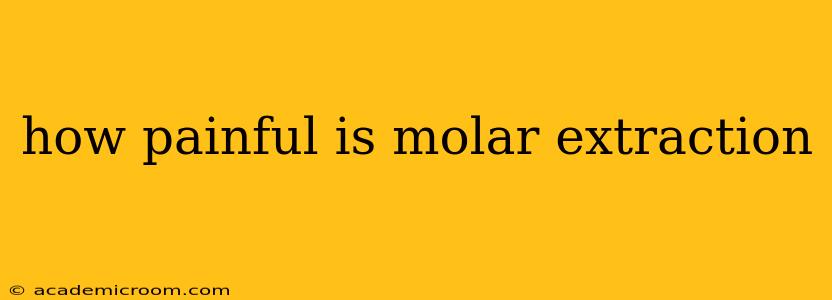How Painful is Molar Extraction? Understanding the Procedure and Managing Discomfort
Extracting a molar can be a daunting prospect, and a common question is: "How painful is molar extraction?" The truth is, the pain experience is subjective and depends on several factors. While some individuals report minimal discomfort, others experience more significant pain. This comprehensive guide will delve into the procedure, pain management strategies, and what you can expect before, during, and after your molar extraction.
What Makes Molar Extraction Different?
Molars, being larger and deeper-seated than other teeth, often present a more complex extraction process. Their roots are longer and more intertwined, potentially requiring more force and time to remove. This can lead to a greater degree of post-operative discomfort for some patients compared to the extraction of smaller teeth.
What Factors Influence Pain Levels During and After Molar Extraction?
Several factors can influence the pain level experienced during and after a molar extraction:
- The Complexity of the Extraction: Impacted molars, those that are partially or fully submerged beneath the gum line, are generally more difficult to extract and result in greater post-operative pain. Simple extractions, where the tooth is fully visible and easily accessible, tend to be less painful.
- The Patient's Pain Tolerance: Individual pain thresholds vary significantly. What one person considers intense pain, another may perceive as mild discomfort.
- The Anesthesia Used: The type and effectiveness of anesthesia play a crucial role. Local anesthesia numbs the area, preventing pain during the procedure. In some cases, sedation or general anesthesia may be used for more complex extractions or for patients with dental anxiety.
- Post-operative Care: Following the dentist's instructions meticulously is critical for minimizing pain and promoting healing. This includes proper medication use, careful cleaning, and avoiding strenuous activities.
- Infection: Infection at the extraction site can significantly increase pain and discomfort. Good oral hygiene and timely attention to any signs of infection are essential.
How Painful is Molar Extraction During the Procedure?
With proper anesthesia, you shouldn't feel any pain during the extraction itself. You may experience some pressure or pulling sensations, but these should not be painful. If you feel any significant pain, inform your dentist immediately.
How Painful is Molar Extraction After the Procedure?
Post-operative pain is more common and varies in intensity. Most patients experience some level of discomfort, often described as a dull ache or throbbing pain. This pain usually peaks within the first 24-48 hours and gradually subsides with proper pain management.
What Pain Relief Options are Available?
Your dentist will likely prescribe pain medication, such as ibuprofen or stronger prescription painkillers, to manage post-operative pain. Over-the-counter pain relievers can also help, but it's crucial to follow your dentist's recommendations. Applying ice packs to the affected area can also reduce swelling and pain.
How Long Does the Pain Last?
The duration of post-operative pain varies. For most individuals, the most intense pain resolves within a few days. However, some mild discomfort may persist for a week or two as the extraction site heals.
What if I Experience Excessive Pain or Other Complications?
If you experience severe pain, excessive bleeding, swelling that doesn't improve, or signs of infection (such as fever or pus), contact your dentist immediately. These could indicate a complication requiring further attention.
Are there ways to minimize pain after molar extraction?
Yes, several steps can help minimize pain after a molar extraction:
- Follow your dentist's instructions carefully: This includes taking prescribed medication as directed, avoiding strenuous activity, and maintaining good oral hygiene.
- Apply ice packs to the affected area: This will help reduce swelling and pain.
- Eat soft foods: This will prevent irritation of the extraction site.
- Rest: Getting plenty of rest will help your body heal more quickly.
This information is for general knowledge and does not constitute medical advice. Always consult with your dentist or oral surgeon for personalized guidance and treatment. They can assess your specific situation and recommend the best approach for your molar extraction.
